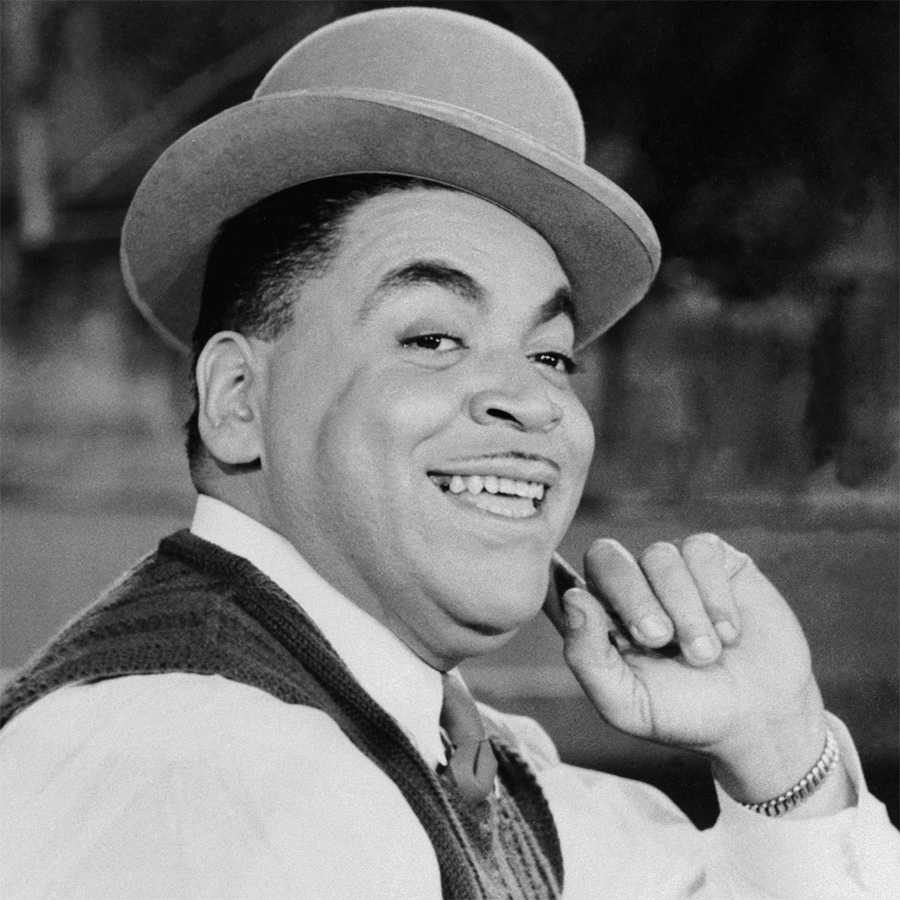Media Billie Holiday + Strange Fruit
Billie Holiday had a hit record with the song “Strange Fruit” in the 1930s, bringing light to the horror of lynching in the American South.
Born
February 7, 1887
Died
February 12, 1983
Country
United States of America
Born and raised in Harlem, Thomas Wright “Fats” Waller worked as a delivery boy for a delicatessen run by brothers Connie and George Immerman. The pair later opened Connie’s Inn, a Harlem nightclub that brought the all-Black musical revue “Hot Chocolates”—and its talented composer, Fats Waller—to audiences before it moved on to Broadway.
Waller learned to play the piano at age six. With his minister father preaching at the Abyssinian Baptist Church, Waller’s first audience was the local congregation.
His first paid gig was to accompany silent movies on the pipe organ at the Lincoln Theatre. From there, he moved on to playing at rent parties and in cabarets.
Waller’s true genius lay in composing. The Fletcher Henderson Orchestra performed several works of his creation, notably “Whiteman Stomp.” His partnership with lyricist Andy Razaf resulted in such famous songs as “Honeysuckle Rose,” as well as hit musicals that included “Keep Shufflin’.” Razaf and Waller also collaborated to produce “Hot Chocolates” in 1929. With trumpeter Louis Armstrong headlining its Broadway cast, the musical brought fame to the Waller-Razaf tune “Ain’t Misbehavin’.”
 |
The Music of
|
If an exuberant stage presence was Waller’s trademark, musical innovation was his legacy. He raised the Harlem stride style of piano playing—characterized by an oompah beat in the left hand and syncopation in the right—to a fine art. Fusing elements of blues, classical music, boogie-woogie, and ragtime with stride, Waller fashioned a new sound that was uniquely his own.
 I n t e r s e c t i o n s |
|
 |
Cab Calloway sang in Waller and Razaf’s “Hot Chocolates.” |
 |
Waller accompanied blues singer Bessie Smith. |
 |
Pianist James P. Johnson was his teacher. |
 |
He accompanied singer Adelaide Hall. |
 |
Waller wrote tunes for the Fletcher Henderson Orchestra. |
Video Bio
Billie Holiday had a hit record with the song “Strange Fruit” in the 1930s, bringing light to the horror of lynching in the American South.
Learn the basics of jazz music and how the art form works. Along with his band, Jason Moran shows you how jazz is more like skateboarding and football than you would think, as well as plays original and classic jazz standards.
From Fairmont Street to U Street, from the Howard Theater to the Bohemian Caverns, take a tour through jazz history with Billy Taylor and Frank Wess, who lead listeners through their hometown’s music scene in this seven-part audio series.
This series, hosted by Connaitre Miller of Howard University, explores why Swing was the most popular dance music in America and how it is still alive today in dance halls, clubs and movies
Eric Friedman
Director, Digital Learning
Kenny Neal
Manager, Digital Education Resources
Tiffany A. Bryant
Manager, Operations and Audience Engagement
Joanna McKee
Program Coordinator, Digital Learning
JoDee Scissors
Content Specialist, Digital Learning
Generous support for educational programs at the Kennedy Center is provided by the U.S. Department of Education. The content of these programs may have been developed under a grant from the U.S. Department of Education but does not necessarily represent the policy of the U.S. Department of Education. You should not assume endorsement by the federal government.
Gifts and grants to educational programs at the Kennedy Center are provided by A. James & Alice B. Clark Foundation; Annenberg Foundation; the Andrew W. Mellon Foundation; Bank of America; Bender Foundation, Inc.; Carter and Melissa Cafritz Trust; Carnegie Corporation of New York; DC Commission on the Arts and Humanities; Estée Lauder; Exelon; Flocabulary; Harman Family Foundation; The Hearst Foundations; the Herb Alpert Foundation; the Howard and Geraldine Polinger Family Foundation; William R. Kenan, Jr. Charitable Trust; the Kimsey Endowment; The King-White Family Foundation and Dr. J. Douglas White; Laird Norton Family Foundation; Little Kids Rock; Lois and Richard England Family Foundation; Dr. Gary Mather and Ms. Christina Co Mather; Dr. Gerald and Paula McNichols Foundation; The Morningstar Foundation;
The Morris and Gwendolyn Cafritz Foundation; Music Theatre International; Myra and Leura Younker Endowment Fund; the National Endowment for the Arts; Newman’s Own Foundation; Nordstrom; Park Foundation, Inc.; Paul M. Angell Family Foundation; The Irene Pollin Audience Development and Community Engagement Initiatives; Prince Charitable Trusts; Soundtrap; The Harold and Mimi Steinberg Charitable Trust; Rosemary Kennedy Education Fund; The Embassy of the United Arab Emirates; UnitedHealth Group; The Victory Foundation; The Volgenau Foundation; Volkswagen Group of America; Dennis & Phyllis Washington; and Wells Fargo. Additional support is provided by the National Committee for the Performing Arts.
Social perspectives and language used to describe diverse cultures, identities, experiences, and historical context or significance may have changed since this resource was produced. Kennedy Center Education is committed to reviewing and updating our content to address these changes. If you have specific feedback, recommendations, or concerns, please contact us at [email protected].